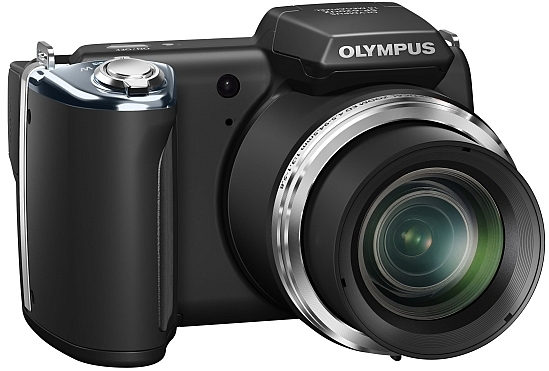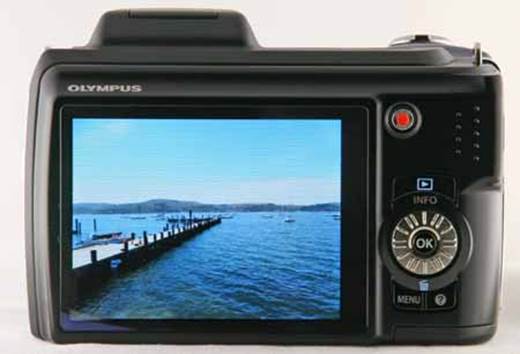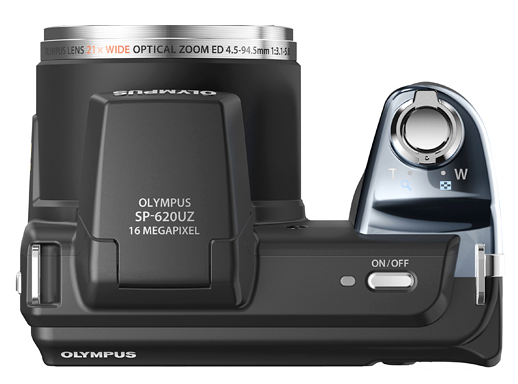Bridge on a budget: We trial Olympus’s
low-cost super zoom
The successor to the Olympus SP-610UZ bucks
the recent trend set by the increasingly premium-priced super zooms trickling
into the market by offering a big zoom lens for a surprisingly small price. On
paper, this new super zoom looks set to offer some impressive features, with a
16-megapixel 1/2.3-inch CCD sensor matching up to the camera’s colossal 21x
optical zoom lens, complete with Dual Image Stabilization technology to help
combat shaky shots at longer focal lengths and/or in low light. The equivalent
focal range that the lens covers is 25 – 525m m (on a 35mm model), making this
a highly versatile camera that’s priced very competitively indeed.

Olympus SP-620UZ
In the hand, the plastic outer shell
available in a black or sliver finish – that clads the SP-620UZ’s relatively
petite body is really the only aspect that hints at any sort of cost-cutting on
the manufacturer’s part. That said, the extra weight provided by the four AA
batteries required to power the camera lends a reassuring sense of balance,
particularly when the lens is extended to its maximum telephoto setting. The
gently curved front grip is very generous and features a rubberized section for
added comfort and a more secure grip on the camera/ when coupled with the
smooth, sculpted area for your thumb around the back, the SP-620UZ proves
comfortable to shoot with for extended periods of time.
Size-wise, this super zoom is surprisingly
compact, in spite of the lens it packs into its diminutive body. When
powered-down, the 21x zoom optic folds away into a relatively small housing
that protrudes from the front panel to extend just past the outer edge of the
front grip. You might be able to cram it into a large coat pocket, but most of
the time you’re more likely to want to make good use of the included neck strap
to keep the camera to hand. Directly above the lens housing is a built-in
pop-up flash unit. It’s manually operated, so you simply flip it up whenever
you want to put it to work. The flash sits relatively high above the lens,
which helps to combat red-eye when shooting portraits and provides adequate
power for most everyday photography at close quarters.

The
LCD offers a middling resolution of 230,000 dots, which is adequate but not
thrillingly detailed when viewing photos
The top panel is home to nothing more than
a small silver power button and a zoom-lever encased shutter release, with the
remainder of the controls located on the back panel. Alongside the 3-inch LCD
there’s just a one touch movie button that gives direct access to the camera’s
HD (720p) film mode, plus a scrolling four way d-pad and playback and Menu/Help
buttons. The up/down arrow keys on the d-pad provide quick shortcuts to the camera’s
on-screen information display (choose from full shooting information, a clean
screen or a useful compositional grip and live histogram) and the Delete
function in playback mode respectively.
As with some of the other recent Olympus
launches, pressing either the left/right arrow keys or the central OK button on
the d-pad activates the on-screen Quick menu. In the absence of a physical mode
dial, this is your only means of accessing the range of exposure modes that the
SP-620UZ has to offer, in addition to other key settings. Beginners are well
catered for, with the Olympus ‘intelligent’ iAuto mode that takes care of all
of the exposure settings for you, as well as a selection of 16 scene modes to
cover a range of photographic situations. If you opt for the latter, you can
manually select from Portrait, Landscape, Sunset, Sports and Night Scene, in
addition to some more unusual options including Cat, Dog, the flattering Beauty
Shot mode and more besides. Scrolling through the menu to get to the mode that
you want can be a bit of a tiresome process, but – on a more positive note –
the fact that you get a short description of what each mode is designed to do
is a useful feature that will make the SP-620UZ easier for new owners to get to
grips with.
Getting creative
If you like to get creative with your
shots, there are in-camera editing options to help you customize your stills
and movies. The latest range of Olympus Magic Filters makes a welcome addition
to the features on offer, with 11 different styles to choose from. Our
particular favorites include the atmospheric Pin Hole, funky Miniature and the
quirky Fragmented filters, although there’s plenty more to explore besides.
The SP-620UZ also offers panorama
enthusiasts 3 different options for capturing wider scenes, although
unfortunately none of them really compares to the impressively simple-to-use
Sweep Panorama features seen on some rival models. What you do get is the
opportunity to work in Auto mode, where you’re required to line up two targets
in-between frames. Once aligned, the camera fires the shutter automatically,
before moving onto the next. Results in this mode are okay on the whole, but
none of our test shots was completely free from ghosting or some sort of
evidence of slight misalignment. You can also use the ‘old school’ method that
you may be familiar with if you’ve previously owned an older compact camera:
you use a ghost image of a portion of the previous frame to line up the next.
Finally, more advanced Pano photographers can choose to shoot frames
individually and combine them on a computer manually later.

Olympus
SP-620 UZ features.
As is becoming popular on many of the
latest launches, this super zoom boasts a 3D shooting mode, which takes two
shots of your subject from different angles and combines them to create a
result that’s suitable for viewing on 3D-enabled TVs and monitors. While
there’s not much else in the way of manual functionality, the SP-620UZ does
provide a Program Auto mode, which offers the greatest level of control over
settings. The options available are all accessed via the Quick Menu, providing
the opportunity to tweak settings including the macro mode, self-timer, white
balance and ISO.
Another couple of areas where the
manufacturer has cut back to keep the price tag low include the screen, which –
although ‘good enough’ for most everyday scenarios – sports a rather
unremarkable 230,000-dot resolution and pretty restricted vertical viewing
angle. The decision to offer 720p HD movie recording capability instead of the
Full HD mode boasted by some of its peers is another feature that may be a
deal-breaker for budding movie enthusiasts, although – on the whole – results
are good enough to satisfy more casual users.
In terms of image quality, the camera
performs reasonably well, producing faithfully-colored images with just enough
saturation to give them a lift. Detail is also good, although some softness is
to be expected when boosting the sensitivity above ISO 400. Noise is generally
well-controlled, with usable results being produced right up to ISO 800; even
ISO 1600 at a push if you don’t mind sacrificing finer details.
The lens does suffer a little from
distortion at its maximum wide and telephoto settings in particular, but that’s
to be expected from a zoom lens on a camera at this price point. Chromatic
aberration is a particularly prominent feature unfortunately, especially when
looking more closely at the edges of shots. More positively however, the
camera’s Macro and Super Macro modes are both excellent, generating crisp shots
with bags of fine detail.
Verdict
With so many alternative super zooms and
Compact System Cameras to choose from at the moment, the SP-620UZ faces some
very stiff competition. It may not beat its rivals in every respect when it
comes to its feature-set and image quality, however – viewed on its own – it
does offer a very versatile focal range and a simplified handling experience
that’s perfect for beginners on a budget. If you want a ‘no-frills’, decent
everyday camera with enough reach to cover a variety of photographic
opportunities is one to consider.
|
Specification
·
Price: $270
·
Megapixels: 16
·
Sensor: 1/2.3-inch CCD
·
LCD: 3-inch, 230,000-dots
·
ISO: Auto, High Auto, ISO 80-1600
·
Video: HD, 1280 x 720 (30fps)
·
Memory cards: SD / SDHC / SDXC (UHS speed
class not supported), 59MB internal
·
Weight: 435g (inc. batt & card)
·
Dimensions: 109.7 x 74.3 x 73.7mm
·
Web: www.olympus.com
·
Total: 7/10
|